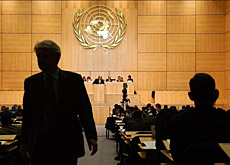
Swiss say UN is falling short on human rights

Switzerland says the United Nations’ top human-rights body, which closed its annual meeting on Friday, has restored some of its credibility but still needs reform.
Officials warned that progress on Nepal, counter-terrorism and Darfur masked deeper problems within the UN Commission on Human Rights (UNCHR) – a view endorsed by Human Rights Watch.
“We think it has been a rather good year for the commission, but it is still not enough,” said Jean-Daniel Vigny, minister for human rights at the Swiss Mission to the UN in Geneva.
“Even if we did do better than two years ago or last year, it’s far from being a great success.”
He told swissinfo that more countries in addition to Belarus, Myanmar, Cuba and North Korea should have been “named and shamed” for human-rights violations. China, Russia and Zimbabwe all escaped censure.
The 61st annual session in Geneva was conducted against a backdrop of calls, notably from non-governmental organisations, for reform or even abolition of the commission.
Earlier this month UN Secretary-General Kofi Annan announced that he was taking up a Swiss proposal to create a new, permanent human-rights council that would address violations as they arose.
He criticised the inability of the commission – which meets only once a year – to prevent human-rights abuses, citing Sudan’s Darfur region as a case in point.
“I think it is unlikely that the next commission will be identical in format, composition and structure to this one,” said UN High Commissioner for Human Rights Louise Arbour.
Vigny said the Swiss were in favour of a standing human-rights council that would meet every two or three months and respond to situations quickly.
Switzerland announced on Friday that it is due to host a meeting of 60 nations in Lausanne early next month to discuss the reform plans.
Reform imminent
Vigny said the background of imminent reform of the commission had served to focus the minds of delegates.
“It made the atmosphere less politicised and less confrontational than last year and more favourable to discussing big issues more objectively,” he said.
The Swiss were engaged on a number of these “big issues”, achieving several notable successes, according to Vigny.
Swiss-led negotiations with Nepal led to an agreement that will see UN human-rights observers stationed in the Himalayan kingdom.
On Wednesday the UNCHR accepted a Swiss resolution calling on Nepal to restore multi-party democracy and reinstate all civil and political rights, which were suspended after a state of emergency was declared on February 1.
Switzerland was also active behind the scenes in pushing for the appointment of special rapporteurs on counter-terrorism and the rights of minorities – two of its focal points during the session.
Vigny added that Switzerland had co-sponsored a resolution condemning human-rights abuses in Darfur, as well as one aimed at ensuring the re-establishment of justice in post-conflict countries.
Active role
Loubna Freih, Geneva director of Human Rights Watch, said Switzerland could be proud of its role during the session but added that opportunities had still been missed.
“There are a very large number of countries that commit human-rights abuses on a daily basis that were not even addressed by the commission, such as China, Iran, Turkmenistan, Zimbabwe, and the situation in Chechnya,” she told swissinfo.
“The terrible situation in Darfur was treated in a lukewarm manner, which led to a compromise decision. Overall, we feel that it [the commission] showed that it cannot effectively address violations of human rights by countries around the world.”
Freih agreed that it was time to set up a permanent human-rights body wielding greater authority.
“If the international community is serious about human rights, it needs to put in place a better and more effective body with improved membership and not some of the world’s violators sitting on it,” she said.
But Human Rights Watch said it was encouraged by the decision to establish a special rapporteur on human rights and counter-terrorism.
Freih said many countries had been quick to introduce counter-terrorism instruments in the wake of September 11 and that there had been very little monitoring by the international community.
“We have seen a lot abuses and we think this is the single most important step the commission has taken this year,” she said.
swissinfo, Adam Beaumont
Switzerland was active in pushing through a number of resolutions during the 61st annual session of the UNCHR.
These included the appointment of special rapporteurs for counter-terrorism and the rights of minorities.
The Swiss delegation helped to secure an agreement with Nepal that will allow UN human-rights observers to be stationed there.

In compliance with the JTI standards
More: SWI swissinfo.ch certified by the Journalism Trust Initiative
















![The four-metre-long painting "Sonntag der Bergbauern" [Sunday of the Mountain Farmers, 1923-24/26] had to be removed by a crane from the German Chancellery in Berlin for the exhibition in Bern.](https://www.swissinfo.ch/content/wp-content/uploads/sites/13/2025/12/01_Pressebild_KirchnerxKirchner.jpg?ver=cb688ed5)














You can find an overview of ongoing debates with our journalists here . Please join us!
If you want to start a conversation about a topic raised in this article or want to report factual errors, email us at english@swissinfo.ch.